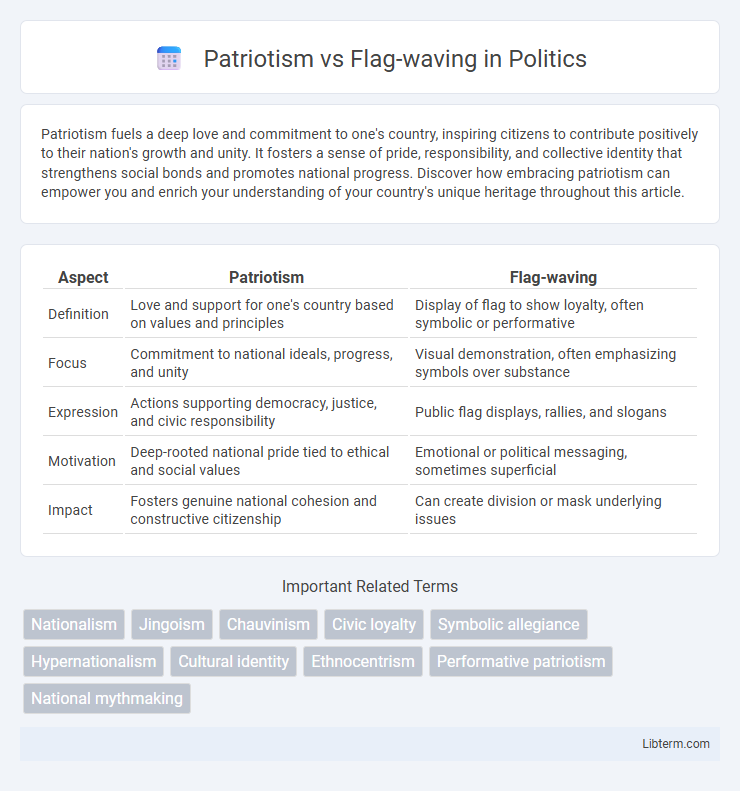Patriotism fuels a deep love and commitment to one's country, inspiring citizens to contribute positively to their nation's growth and unity. It fosters a sense of pride, responsibility, and collective identity that strengthens social bonds and promotes national progress. Discover how embracing patriotism can empower you and enrich your understanding of your country's unique heritage throughout this article.
Table of Comparison
| Aspect | Patriotism | Flag-waving |
|---|---|---|
| Definition | Love and support for one's country based on values and principles | Display of flag to show loyalty, often symbolic or performative |
| Focus | Commitment to national ideals, progress, and unity | Visual demonstration, often emphasizing symbols over substance |
| Expression | Actions supporting democracy, justice, and civic responsibility | Public flag displays, rallies, and slogans |
| Motivation | Deep-rooted national pride tied to ethical and social values | Emotional or political messaging, sometimes superficial |
| Impact | Fosters genuine national cohesion and constructive citizenship | Can create division or mask underlying issues |
Understanding Patriotism: Beyond the Surface
Understanding patriotism requires recognizing it as a deep commitment to a nation's values, history, and future rather than mere displays of flag-waving. True patriotism involves critical reflection, active civic engagement, and a willingness to address a country's flaws for collective progress. Focusing on actions that promote unity, justice, and social responsibility offers a more meaningful expression of national pride than symbolic gestures alone.
The Symbolism of Flag-waving Explained
Flag-waving serves as a powerful symbolic act representing collective identity, national pride, and unity, often evoking emotional responses tied to shared history and values. Unlike patriotism, which encompasses a deeper sense of loyalty, civic responsibility, and active engagement in the nation's welfare, flag-waving primarily functions as a visible display of allegiance or support. This symbolic gesture can unify communities during national events while sometimes being critiqued as superficial if detached from meaningful patriotic action.
Historical Perspectives on Patriotism and Flags
Historical perspectives reveal that patriotism embodies a deep-rooted love and commitment to one's country, often expressed through values, sacrifices, and civic duties, while flag-waving primarily symbolizes national identity and unity through visible displays. Throughout history, flags have served as powerful emblems during wars, revolutions, and independence movements, rallying collective pride and resistance. However, historians distinguish genuine patriotism as a nuanced, enduring spirit beyond mere ceremonial flag-waving, highlighting the substantive actions and principles behind national loyalty.
Emotional vs Rational Foundations of Patriotism
Patriotism is grounded in a deep emotional connection to one's country, stemming from shared history, values, and collective identity, fostering genuine pride and commitment. Flag-waving often symbolizes a superficial or performative expression of national loyalty, relying more on visual displays than on critical reflection or understanding of national ideals. Rational foundations of patriotism emphasize informed civic engagement and principled support for democratic institutions beyond symbolic gestures.
When Flag-waving Becomes Performative
Flag-waving becomes performative when it prioritizes spectacle over genuine civic engagement, reducing patriotism to symbolic displays rather than meaningful actions. True patriotism involves active participation in democratic processes, social responsibility, and critical reflection on national values beyond public ceremonies. Overemphasis on flag-waving can mask systemic issues and discourage constructive dialogue, undermining the core principles patriotism seeks to uphold.
Patriotism in Action: Deeds Over Displays
Patriotism in action emphasizes meaningful contributions such as community service, civic engagement, and supporting veterans, rather than merely displaying the flag. Genuine patriotism reflects in efforts to uphold democratic values, defend human rights, and promote social justice within the nation. Acts like volunteering, voting, and advocating for positive change demonstrate a deeper commitment than symbolic gestures alone.
The Role of National Symbols in Identity
National symbols like flags serve as powerful markers of collective identity, embodying shared history, values, and cultural heritage. While patriotism reflects a genuine emotional attachment and commitment to a nation's ideals, flag-waving often reduces complex national identity to superficial displays. Understanding the role of national symbols requires recognizing their potential to unify citizens meaningfully rather than merely functioning as performative gestures.
Media Influence: Shaping Perceptions of Patriotism
Media plays a crucial role in shaping perceptions of patriotism by framing flag-waving as a primary symbol of national loyalty, often overlooking deeper civic engagement and critical reflection. News outlets and social platforms amplify visual displays of flags during national events, reinforcing a narrow definition of patriotism tied to symbolism rather than policy or community service. This media-driven narrative influences public opinion, equating flag-waving with genuine patriotism while marginalizing more substantive expressions of national pride.
Dangers of Misplaced National Pride
Misplaced national pride often manifests as blind flag-waving, obscuring critical reflection on a country's policies and history, which can lead to xenophobia and intolerance. Such uncritical patriotism risks undermining democratic values by discouraging dissent and justifying harmful actions in the name of national loyalty. Recognizing the distinction between thoughtful patriotism and superficial flag-waving is essential to fostering civic responsibility without enabling nationalism that marginalizes others.
Fostering True Patriotism in Modern Society
Fostering true patriotism in modern society involves promoting informed civic engagement, respect for democratic principles, and critical thinking about national policies rather than mere flag-waving. Genuine patriotism encourages citizens to hold their country accountable while striving for social justice and unity. Emphasizing education and community involvement cultivates a deeper connection to national values beyond symbolic displays.
Patriotism Infographic

 libterm.com
libterm.com